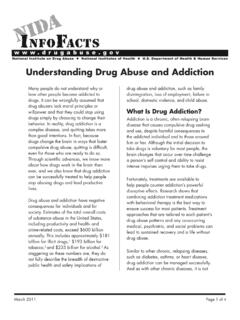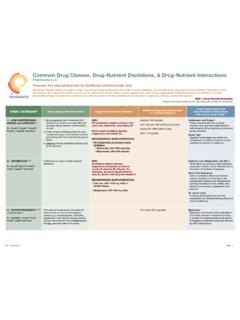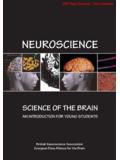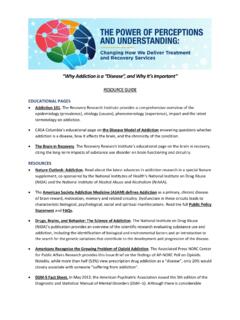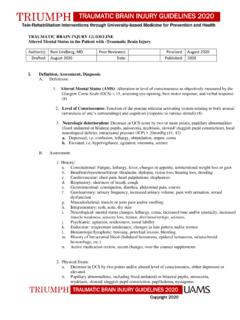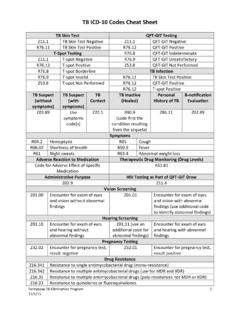Transcription of Healing the Addicted Brain
1 1 Healing the Addicted BrainInnovative Addiction Support and TreatmentHarold C. Urschel III MD, MMAC hief Medical Strategist - Enterhealth2 Credentials Author of The New York Timesbest seller, Healing the Addicted Brain Board certified in addiction and general psychiatry by the American Board of Medical Specialties Published work in the areas of opiate dependence, alcohol dependence, cocaine dependence and anti-addiction medications Education: Cum Laude with a Bachelor of Arts in Neuropsychology from Princeton University Doctorate of Medicine degree from the University of Texas Southwestern Medical School Clinical research fellowship at the University of Pennsylvania/Veteran's Administration Medical Center Masters of Management Administration degree from Stanford University Graduate School of Business 3 Enterhealth Overview Enterhealth is a premier addiction disease management company in Dallas, TX.
2 Operates Residential and Outpatient treatment facilities Board Certified doctors, psychiatrists and therapists specializing in addiction treatments are on-site 24 hours-a-day Round-the-clock, specially trained nurses Withdrawal Stabilization (detox) capabilities Neurological testing and treatments Anti-addiction medications Dual diagnosis Mission: To deliver a Continuum of Care using the latest scientific protocols and medical breakthroughs to block the effects of alcohol and drugs, lessen the affects of withdrawal, and decrease cravings so that the Brain s neurological pathways have a chance to The Science of Alcohol and drug Addiction Leading drug classes of abuse Alcohol, Marijuana & Opiates Anti-Addiction Medication Breakthroughs Science-Based Treatment Wrap up/Q&A5 Addiction is a Brain Disease6 Addiction is a DiseaseWhy has drug and alcohol abuse been labeled as a chronic medical disease?
3 Think of addiction like another disease, cancer: It is deadly if you get it and do not get treated If you do get proper treatment, it could still come back It is similar to other diseases (Asthma, Diabetes, High Blood Pressure) that have to be managed throughout our lives7 The Brain Cell (Neuron)ReferenceNational Institute of drug Abuse. Drugs, brains, and behavior. The science of addiction. National Institutes of Health. NIH Pub No. 10 5605. Available at: Last updated August 2010. 8 Synapse: Where the Action isReferenceNational Institute of drug Abuse. Drugs, brains, and behavior.
4 The science of addiction. National Institutes of Health. NIH Pub No. 10 5605. Available at: Last updated August 2010. 9 The Brain is Vulnerable Research shows that alcohol and drug abuse causes a significant negative impact to the memory center of the Brain Using drugs and alcohol disrupts the Brain in unhealthy ways, making it harder to cope with social situations and the normal pressures of life The Brain s reward circuits (the dopamine system) get damaged when individuals are under the influence and repeat use magnifies the problem and makes it harder to stop10 Right side surfaceFront on surface38 year old male with 17 years of heavy weekend alcohol use marked overall decreased activitySPECT images courtesy of Amen, brainUnderside surfaceDrug and Alcohol use creates profound changes in Brain metabolism.
5 Brain Neuroscience11 Alcohol Dependent IndividualsBrain NeuroscienceMyrick, Anton, Li et al., Archives of General Psychiatry, April 2008fMRI images of Brain s reward system demonstrate how the Brain reacts to environmental triggers. Social drinkers Neutral cues vs. Alcohol cues Alcohol dependent (non-treatment seeking)Social Drinkers12 Limbic RegionRole: Drive generationCortexRole: Decision Making Thinking Reasoning RationalizingComprehensive TreatmentTherapy: Individual, Family, Group AA / 12-step Fellowships Faith-based Guidance and Support Trauma, Stress Management Nutrition and Wellness Therapy: Anti-addiction medication(as needed) Dual disorder medication(as needed)Addiction requires a multi-dimensional treatment approach to help sustain long-term sobriety.
6 13 Typically, substance abuse is the result of or a part of other behavioral health disorders. Depression (50 75% of alcoholics) Anxiety Disorders Bipolar Disorders Schizophrenia ADD/ADHDDual Disorders14 Nutritional deficits should be treated with dietary improvements and supplementationNeurobiologicaldysregulat ion should be treated with pharmacotherapyDysfunctional behavior should be addressed with psychosocial interventionsSubstance DependenceA Complex Disorder15 Frequent Expectations of Alcoholism Treatment Addiction is an acute condition that should be effectively treated with detoxification Treatment is expected to produce lasting reduction in symptoms following termination of treatment
7 Relapse after treatment is often considered a treatment failure Treatment doesn t work16 Top Addictive SubstancesAlcohol, Marijuana & Painkillers17 Alcohol18 Little Known Statistics Alcoholism is the third leading disease causing death in the US behind cancer and heart disease Over 100,000 Americans a year die from alcohol Alcohol and drug problems are the second most common mental disorder (6-7% of all adults) Approximately 50% of the risk is attributed to genetics Genetic factors in combination with other biological or environmental factors Alcoholism may arise without any apparent family history of dependence; caused by environmental or interpersonal factors Most hospital healthcare systems do not have treatment programs for alcohol and drug addiction19 Brain ActivityAlcohol drinking markedly reduces Brain metabolismSource: National Institute on Alcohol Abuse and Alcoholism.
8 Dec 200820 Impact of Chronic Alcohol UseReduced Brain size1 Short-term memory loss4 Altered Brain cell function1 Increased cancer risk, especially cancer of the oral cavity, pharynx, esophagus, and larynx2 Reduced pain perception4 Cardiovascular disease3 Altered blood sugar levels4 Liver cirrhosis4 Immune system disorders4 Weakness and breakdown of muscle3 Bones predisposed to fracture5 References: 1. Oscar-Berman M, et al. Alcohol Res Health. 2003;27 Bagnardi V, et al. Alcohol Res Health. 2001;25 Mukamal KJ, et al. Alcohol Res Health. 2001;25 National Institute on Aging.
9 AgePage: alcohol use and abuse. Available at: Accessed April 4, Turner RT. Alcohol Clin Exp ;24 full Prescribing Information. Odyssey Pharmaceuticals, ReVia full Prescribing Information. Duramed Pharmaceuticals, full Prescribing Information. Merck Sant Prescribing Information. Alkermes, (naltrexone for extended-releaseinjectable suspension)4195130 tabs/month*(1 tab/day)Antabuse (disulfiram)1199430 tabs/month*(1 tab/day)ReVia (naltrexone)22004 Campral (acamprosate)3180 tabs/month*(2 tabs, 3x/day)Medications for Alcohol Dependence22 Vivitrol23 Vivitrol* (380 mg/month) Campral* (2gm/day) Naltrexone (50mg/day) Antabuse (250mg/day) Baclofen Ability (up to 10-15mg/day) Topomax (200-300mg/day) Ondansetron*Highly recommended for every alcoholicMedications for Alcohol Recovery24 GABA and Glutamate Systems.
10 Increase the effects of GABA, the major inhibitory neurotransmitter in the Brain Inhibit the effects of glutamate, the major excitatory neurotransmitter in the Brain Contribute to decreased anxiety and increased sedation during acute alcohol intakeEffects of Alcohol on Brain Circuits25 Initiate as soon as possible after alcohol withdrawal when a patient achieves abstinence Maintain treatment if patient relapses Recommended dose: two 333mg tablets taken three times a day After 2 weeks change to three tabs BID Patients with moderate renal impairment* should have a starting dose of 1 x 333mg, 3 times daily Can be taken with or without mealsAcamprosate Dosage and Administration260 102030405060708090% of Recommended Care DeliveredMcGlynn et al.
